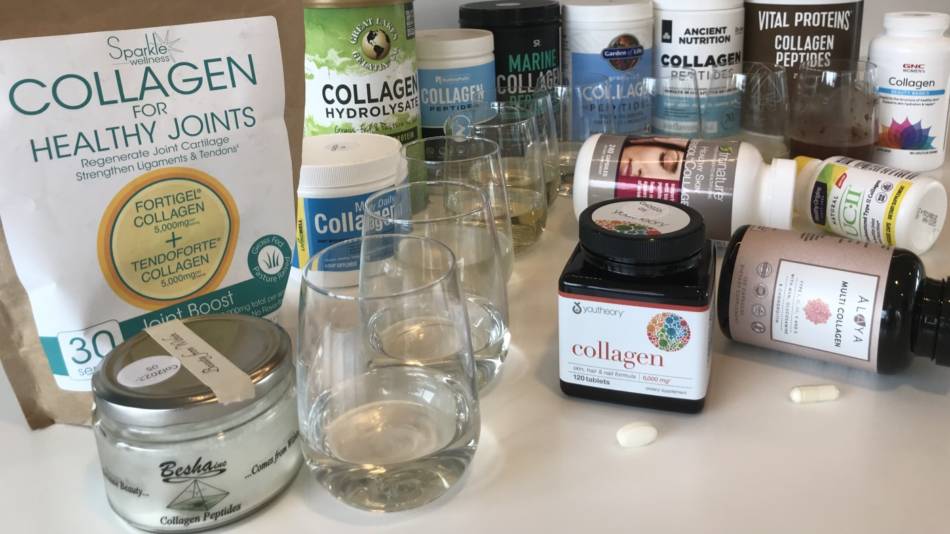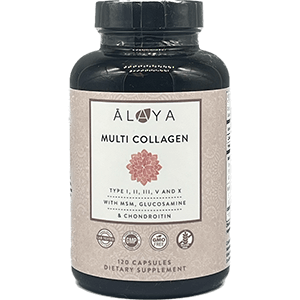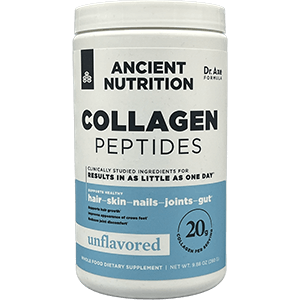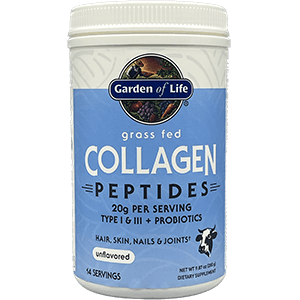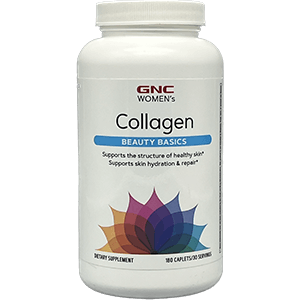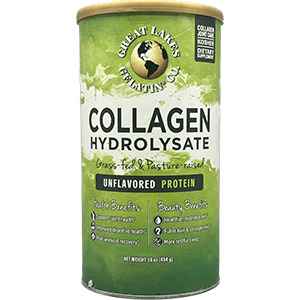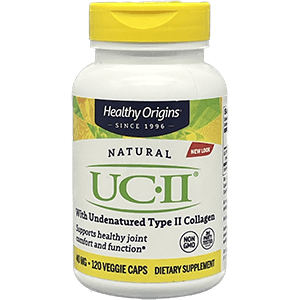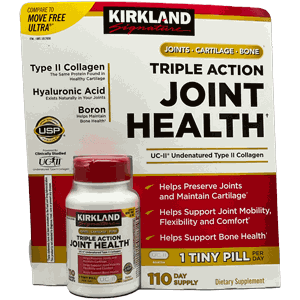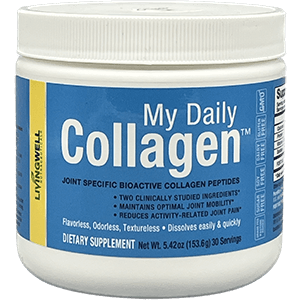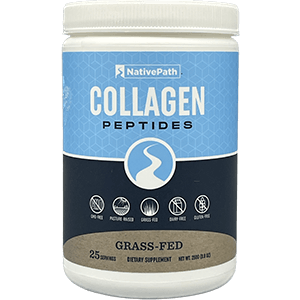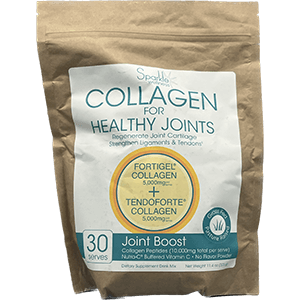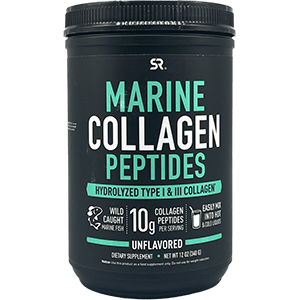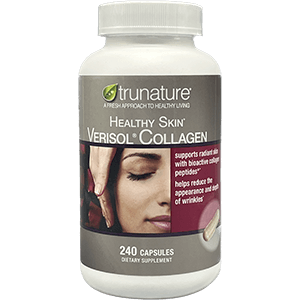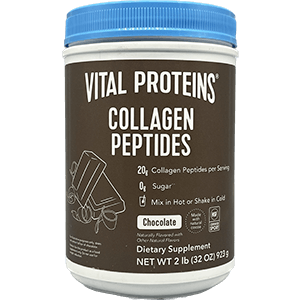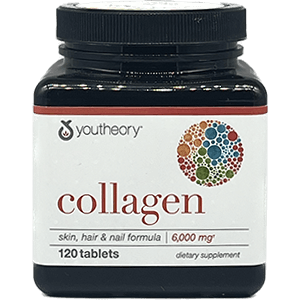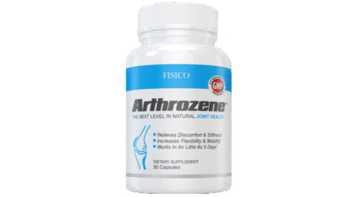Summary
-
What is collagen?
Collagen is a type of protein found in the skin (types I and III collagen), joints (type II collagen) and other parts of the body. It uniquely contains the amino acid hydroxyproline, along with other amino acids. Collagen in supplements is typically hydrolyzed, i.e., broken down to amino acids and/or chains of amino acids (peptides) to improve absorption as well as the ease with which it mixes into liquids, such as cold water. The specific composition of these "collagen hydrolysate" or "collagen peptide" products can vary somewhat depending on how they are hydrolyzed (which typically involves heat and enzymes). Gelatin also contains collagen, but is not soluble in cold water (see What It Is).
-
Health benefits of collagen:
Collagen appears to modestly reduce wrinkles and slightly improve the appearance of cellulite. It may also modestly improve joint pain and/or flexibility in osteoarthritis, help with tendons, and possibly help with the treatment of pressure ulcers, burns, and bleeding gums. These effects can require two to six months of daily use (see What It Does).
-
What did CL's tests of collagen supplements find?
ConsumerLab's tests showed that most products contained their expected amounts of collagen, ranging, per daily serving, from about 2.9 grams to 20 grams among powders, and from 1.8 grams to 6 grams for tablets and capsules. A cartilage-based "UC-II" product contained a much smaller amount (10 mg) but this is appropriate for that particular ingredient. However, another "UC-II" containing product had a smaller amount of collagen and did not receive Approval in testing (see What CL Found and How Products Were Evaluated).

Best collagen supplements?
Among the products Approved in testing, ConsumerLab selected a Top Pick for skin (wrinkles) and a Top Pick for joint pain. In addition to passing tests for quality, these products contained brands used in clinical studies that suggest benefits and, for powders, had superior taste when mixed in liquid.-
How much collagen should I use?
Typical daily dosage of hydrolyzed collagen is 1 to 10 grams. Dosing with UC-II, a cartilage-based product, is much lower. Collagen may be taken with or without food. There is no "vegan collagen," as plants do not produce collagen. However, there are some supplements that contain certain vitamins, amino acids, and other ingredients used in building collagen. For details see ConsumerTips.
-
Collagen supplements safety and side effects:
Collagen supplements are generally well-tolerated, but mild side effects including gastrointestinal symptoms, headache, dizziness and rash can occur. People with allergies to specific sources of collagen (such as fish) should avoid collagen products derived from these sources. Stop taking collagen before certain bone-related blood tests. Although there is theoretical concern that collagen and gelatin (including gelatin capsules) derived from cows could be contaminated with the infectious agent that causes “mad cow disease,” these ingredients are not derived from high-risk tissue and are subject to regulations that make this unlikely. For details, see Concerns and Cautions.
Products tested in 2023 and 2025
+— 78 sources
In addition the results of its expert testing, ConsumerLab uses only high-quality, evidence based, information sources. These sources include peer-reviewed studies and information from agencies such as the FDA and USDA, and the National Academy of Medicine. On evolving topics, studies from pre-print journals may be sourced. All of our content is reviewed by medical doctors and doctoral-level experts in pharmacology, toxicology, and chemistry. We continually update and medically review our information to keep our content trustworthy, accurate, and reliable. The following sources are referenced in this article:
- Alcock, Front Nutr 2019
- Cheng, African J Biotechnol 2011
- Varani, Am J Pathol 2006
- Virgilio, Front Nutr 2024
- Bongers, Appl Physiol Nutr Metab 2020
- Bruyere, Comp Ther in Med 2012
- CSA 2025
- Campos, J Cosmet Dermatol 2019
- Campos, Molecules 2021
- Choi, Clin Exp Dermatol 2014
- Choi, J Cosmet Laser Ther 2014
- Crowley, Int J Med Sci 2009
- Cánovas, Nutrients 2022
- Devasia, Cartilage 2024
- Devasia, J Diabetes Metab 2020
- Dressler, J Sports Sci Med 2018
- Eskiyurt, J Arthritis 2019
- GROW 2025
- Hatanaka, J Enzyme Inhib Med Chem 2014
- Hewlings, J Med Food 2019
- Hexsel, J Cosmet Dermatol 2017
- Iwai, J Agric Food Chem 2005
- Jockel-Schneider, Nutrients 2022
- Kalman, J Cosmet Dermatol 2020
- Kim, J Med Food 2022
- Kumar, J Sci Food Agric 2014
- Kuwaba, J Diet Suppl 2024
- König, Nutrients 2018
- Lee, Adv Skin Wound Care 2006
- Liang, J Food Sci 2010
- Lugo, J Int Soc Sports Nutr 2013
- Lugo, J Int Soc Sports Nutr 2019
- Lugo, Nutr J 2016
- Matsuda, J Nutr Sci Vitaminol 2006
- Miyab, Burns 2020
- Mohammed, Nutrients 2021
- Myung, Am J Med 2025
- Nomoto, Adv Skin Wound Care 2020
- Nulty, Eur J Sport Sci 2025
- Oesser, J Nutr 1999
- Park, J Funct Food 2024
- Pogacnik, J Funct Foods 2023
- Praet, Nutrients 2019
- Proksch, Cosmetics 2025
- Proksch, Segger, Skin Pharmacol Physiol 2014
- Proksch, Skin Pharmacol Physiol 2014
- Ruff, Int J Phys Med Rehabil 2020
- Sangsuwan, J Dermatolog Treat 2020
- Schunck, J Med Food 2015
- Schwartz Clin Interv Aging 2012
- Schwartz, Altern Ther Health Med 2019
- Shiojima, J Am Nutr Assoc 2022
- Shuster, Br J Dermatol 1975
- Sugihara, Sci Rep 2018
- Trc, Intl Orthop 2011
- Vleminckx, J Cosmet Dermatol 2024
- Yamanaka, J Nutr Intermed Metab 2017
- Yuenyongviwat, Sci Rep 2025
- Zdzieblik, Br J Nutr 2015
- Zdzieblik, J Bone Metab 2021
- Zhu, Am J Med Sci 2010
- Hsu, Nutrients 2021
- Lin, J Funct Food 2024
- Barnett, Arthritis Rheum 1998
- Delgado, Arch Gen Psychiatry 1990
- Eastell, Treatment of Postmenopausal Woman 2007
- FDA, 21 CFR Parts 189 and 700
- Kalic, J Allergy Clin Immunol 2020
- Kathuria, Neurology 2022
- Knight, Kidney Int 2008
- Lu, J Cell Biol 2012
- Luo, LWT 2020
- Paul, Nutrients 2019
- Seibel, Clin Biochem Rev 2005
- Vijven, Osteo and Cartl 2012
- Walens, Elife 2019
- Wheater, J Transl Med 2013
- Zhang, Arthritis Rheum 2008
You must be a member to get the full test results along with ConsumerLab.com's recommendations and quality ratings for collagen supplements. You will get results for 11 collagen supplements selected for testing by ConsumerLab plus four others that passed the same testing in CL's voluntary Quality Certification Program.
In this comprehensive review of collagen supplements you'll learn:
 Which collagen supplements failed or passed ConsumerLab's tests
Which collagen supplements failed or passed ConsumerLab's tests CL's Top Pick collagen supplements for skin (wrinkles) and for joint pain
CL's Top Pick collagen supplements for skin (wrinkles) and for joint pain How collagen supplements compare on the amounts of collagen they contain, impurities, quality, price, and other ingredients
How collagen supplements compare on the amounts of collagen they contain, impurities, quality, price, and other ingredients  The clinical evidence for and against using collagen supplements for wrinkles and dryness in aging skin, joint pain and stiffness, and building muscle, as well as information about hyaluronic acid (an ingredient added to some collagen products)
The clinical evidence for and against using collagen supplements for wrinkles and dryness in aging skin, joint pain and stiffness, and building muscle, as well as information about hyaluronic acid (an ingredient added to some collagen products)
 The differences among types of collagen (types I, II and III), forms of collagen (collagen hydrolysate, collagen peptides, gelatin, and "raw" undenatured collagen), and branded ingredients (Verisol, NeoCell, BioCell, UC-II, and NT2)
The differences among types of collagen (types I, II and III), forms of collagen (collagen hydrolysate, collagen peptides, gelatin, and "raw" undenatured collagen), and branded ingredients (Verisol, NeoCell, BioCell, UC-II, and NT2) Dosage for specific uses including wrinkles, joint pain, and building muscle
Dosage for specific uses including wrinkles, joint pain, and building muscle Safety and side effects with collagen supplements
Safety and side effects with collagen supplements
As a ConsumerLab.com member, you may print a copy of this report for your personal use.
You can access a special print version by clicking the "Print" icon in the upper right corner of this report.
You can then use your web browser's print functions to print the whole report or just selected pages.
You may also email or post a link to this report using the web address above.
Non-members using the link will see a free summary and can join to view the full report.
Other means of copying or distributing this report, in part or full, are not permitted.
If you are sight-impaired and your computer is having trouble converting the text in this report to speech,
contact us for assistance at Membership@ConsumerLab.com or by
phone at 914-722-9149.

